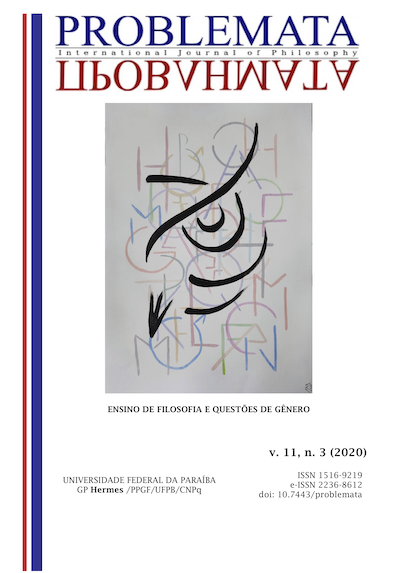FILOSOFIAS E GÊNEROS:
DESAFIOS PARA ENSINAR A FILOSOFAR
DOI:
https://doi.org/10.7443/problemata.v11i3.55593Keywords:
Gender, Teaching Philosophy, Philosophical Education, Microcoloniality, Microcounter-conductAbstract
This article asks about the kairós to philosophize and to teach philosophizing and it also recognizes thinking as a political and counter-conduct act. It aims to understand what Philosophies and Teaching Phylosophy can do in view of the contemporary reality challenges in their context of violence and discrimination that involve gender identities. It’s a challenge to think about Brazil because it’s the country (the first one in the world) where hundreds of LGBTQI+ community members are murdered and where femicide also makes thousands of victims every year. There is also a challenge to recognize the gender issues as an object of philosophical problematization, with their ontological, aesthetic and ethical implications (also political), therefore the challenge of addressing these issues in Teaching Philosophy. Some challenges refer to the place (or non-place) of women philosophers in the history of Philosophy and in the Philosophy manuals and it also refers to the problem of sexist and chauvinist language. At the last, text provokes thinking about the microcolinialities and the microcontraconducts related to gender and race issues.
Downloads
Downloads
Published
Issue
Section
License
Authors who publish with this journal agree to the following terms:
- Authors retain copyright and grant the journal right of first publication with the work simultaneously licensed under a Creative Commons Attribution License that allows others to share the work with an acknowledgement of the work's authorship and initial publication in this journal.
- Authors are able to enter into separate, additional contractual arrangements for the non-exclusive distribution of the journal's published version of the work (e.g., post it to an institutional repository or publish it in a book), with an acknowledgement of its initial publication in this journal.
-
- Authors are permitted and encouraged to post their work online (e.g., in institutional repositories or on their website) prior to and during the submission process, as it can lead to productive exchanges, as well as earlier and greater citation of published work (See The Effect of Open Access).





